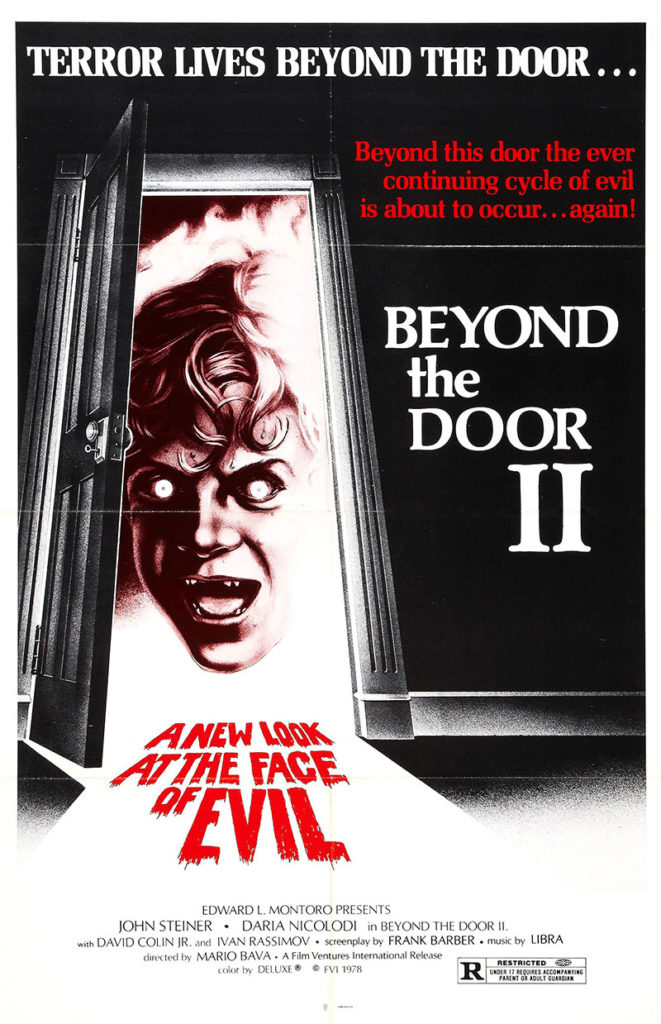 Mario Bava was a giant of horror. His Black Sunday is an atmospheric horror classic that should be on any horror fan’s list of films to see. Shock, released in the United States as Beyond the Door II (it bears no relation to Beyond the Door — the title was strictly promotional), was Bava’s last film before his death. It’s not a bad way to go out, but it’s also a workaday horror film, missing the weirdness that made Bava’s other works, and Italian horror films in general, so special.
Mario Bava was a giant of horror. His Black Sunday is an atmospheric horror classic that should be on any horror fan’s list of films to see. Shock, released in the United States as Beyond the Door II (it bears no relation to Beyond the Door — the title was strictly promotional), was Bava’s last film before his death. It’s not a bad way to go out, but it’s also a workaday horror film, missing the weirdness that made Bava’s other works, and Italian horror films in general, so special.
The film, released in 1977, follows the travails of the Baldini family. Things are going just fine at the start. Bruno Baldini (John Steiner), his wife, Dora (Daria Nicolodi), and Dora’s son from her first marriage, Marco (David Colin, Jr.), move to a new house. It’s not a new house for Dora, however. It’s the house in which she and her first husband used to live, before he killed himself. That tragedy sent Dora around the bend, ending in a stay at a psychiatric hospital. Despite this, after she has put her life back together and restarted a family, she agrees to move back into the house. It’s a nice place, but still…
Shock sets itself up as fairly standard ghost fair. For most of the movie, that’s what we get. Marco is the first to notice the spectral happenings, but being a child in a film like this, he is unconcerned, and strangely receptive. It’s Dora that becomes bothered by supernatural hallucinatory visions. Meanwhile, Bruno is the typical father figure in familial ghost flicks — skeptical and largely absent.
There’s little mystery about what’s going on. It’s clear early on that the family is being haunted by the spirit of Dora’s first husband. Not only that, but the spirit seems to be taking possession of Marco at times, and the spirit is a jealous ex. He doesn’t like that Dora is shacking up with a new man, and much of the disturbances in the house, and Marco’s strange behavior, have to do with Dora and Bruno being together. For the first half of the film, none of this is all that impressive. The film moves along as if by rote, without bothering to try anything all that frightening. It isn’t until the final act, when Dora is in full-on freakout mode, that the film rises to its potential. And even here, there isn’t anything with which horror audiences will be unfamiliar. The major difference is that the first half of this film is mediocre, while the second half is better.
Nicolodi and Steiner, being the adults in the cast, give the best performances. Nicolodi carried most of the load, being the star. My only criticism of her performance is that the psychological troubles she goes through later in the film were not foreshadowed at all in the first act. Dora is a recovering psychiatric patient revisiting a scene of violent trauma, and her mood isn’t even hinted at until later in the film. There are no hesitations or uncertainties about her when they move into the house. A little indication that there was some uneasiness behind her facade would have done much for character development, I think.
As for Colin, his performance as Marco is something that a viewer will just have to endure. The dubbing in the English version is garish. The kid only has one volume, and that volume is loud. Marco is also an adult’s version of what a happy kid is supposed to be, which is always grating in a movie. In Bava’s vision, Marco is the very personification of childhood innocence, and he batters one over the head all film long with it. The intention seems to have been to draw a stark dichotomy between the times when Marco is just being Marco and when he is under the influence of his dead father, but Bava erred in making Marco so enthusiastically innocent. Marco is not endearing, nor is he a character that I wanted to see saved. I just wanted him to take a trip to Grandma’s for the rest of the film.
There is quite a lot that weighs this film down. From a highly regarded filmmaker such as Bava, this can be considered a middling effort, at best. Well, even Scorcese has shot a forgettable flick here and there.
